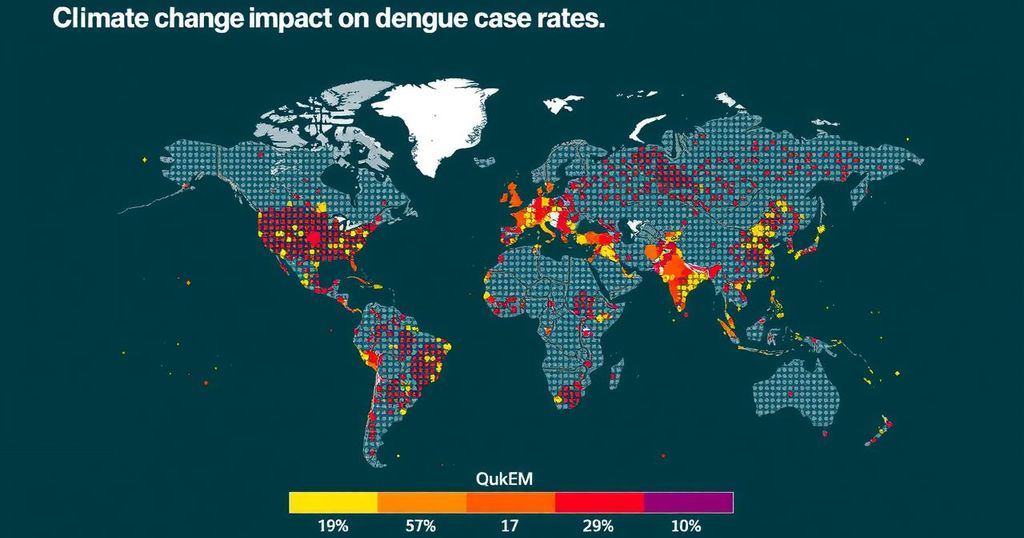Climate change
AFP, AMERICAN SOCIETY OF TROPICAL MEDICINE AND HYGIENE, AMERICAS, ASIA, BOLIVIA, BRAZIL, CLIMATE, CLIMATE CHANGE, CUBA, ERIN MORDECAI, GLOBAL WARMING, MEXICO, MOR, MORDECAI, NORTH AMERICA, PARIS AGREEMENT, PERU, PHILIPPINES, RESEARCH, SOUTH AMERICA, STANFORD UNIVERSITY, UNITED STATES, WORLD HEALTH ORGANIZATION
Jamal Walker
0 Comments
Climate Change Linked to 20% Rise in Global Dengue Cases
U.S. researchers estimate that climate change is responsible for nearly 20% of the global dengue cases this year. The study indicates that rising temperatures facilitate the spread of the virus, particularly in areas typically unaffected by the disease. An innovative solution using Wolbachia-infected mosquitoes shows promise in reducing case numbers in Brazil, highlighting the intersection of climate and health, and emphasizing the urgent need for climate action.
Recent investigations reveal that climate change is responsible for approximately 20% of the unprecedented dengue cases reported globally this year. As rising temperatures facilitate the spread of the disease, researchers are striving to establish a clear link between climate change and its impact on public health. With a particular focus on dengue, which is highly sensitive to climatic conditions, they highlight that human-driven changes in weather patterns can exacerbate disease outbreaks. The viral disease, transmitted by infected mosquitoes, has seen a notable expansion into new geographical areas due to temperature increases, rendering it a critical concern for global health. In a comprehensive study involving 21 countries across Asia and the Americas, scientists determined that nearly 19% of dengue cases are attributable to climate change that has already occurred. Optimal conditions for dengue propagation exist at temperatures between 20-29 degrees Celsius (68-84 degrees Fahrenheit). Elevated regions of countries such as Peru, Bolivia, Mexico, and Brazil are projected to face a surge in dengue cases, potentially increasing by 200% over the next 25 years. Alarmingly, around 257 million individuals are presently residing in areas where global warming could notably amplify dengue transmission within this timeframe. In addition to addressing climate issues, researchers are exploring innovative solutions such as breeding mosquitoes infected with the Wolbachia bacterium. This bacteria has shown promise in blocking the transmission of dengue. Experiences from Niteroi, Brazil, where Wolbachia-infected mosquitoes have been released, indicate that the region experienced only a slight increase in dengue cases during the country’s most severe outbreak. This development demonstrates that Wolbachia could provide long-term community protection against the escalating frequency of dengue outbreaks globally. The findings indicate an urgent need for public awareness regarding the health implications of climate change, particularly dengue’s sensitivity to temperature fluctuations. As dengue cases have reached over 12.7 million globally this year, the actual toll could be closer to 100 million due to significant underreporting. The case illustrates the critical intersection between environmental factors and public health, advocating for immediate attention and action to mitigate the repercussions of climate change.
The relationship between climate change and the resurgence of infectious diseases is an emergent area of research, particularly as extreme weather events become increasingly frequent. Dengue fever, a mosquito-borne viral disease, has traditionally been confined to tropical and subtropical regions; however, shifting climatic conditions are enabling its expansion into new territories. Researchers are now rigorously investigating how anthropogenic climate change not only influences weather patterns but also acts as a catalyst for public health crises, notably with diseases sensitive to environmental variables like dengue. In this context, the need for innovative disease control measures, such as the use of Wolbachia-infected mosquitoes, is paramount to safeguarding communities.
The compelling evidence linking climate change to the increase in dengue cases highlights the urgent need for global action to address environmental changes and their health ramifications. With a significant proportion of dengue cases attributable to rising temperatures, the public health community must prioritize interventions that mitigate climate impacts while advancing innovative solutions like Wolbachia. As the climate crisis continues to evolve, it is evident that safeguarding future health will necessitate a multifaceted approach encompassing climate action, disease prevention, and community resilience initiatives.
Original Source: www.voanews.com




Post Comment